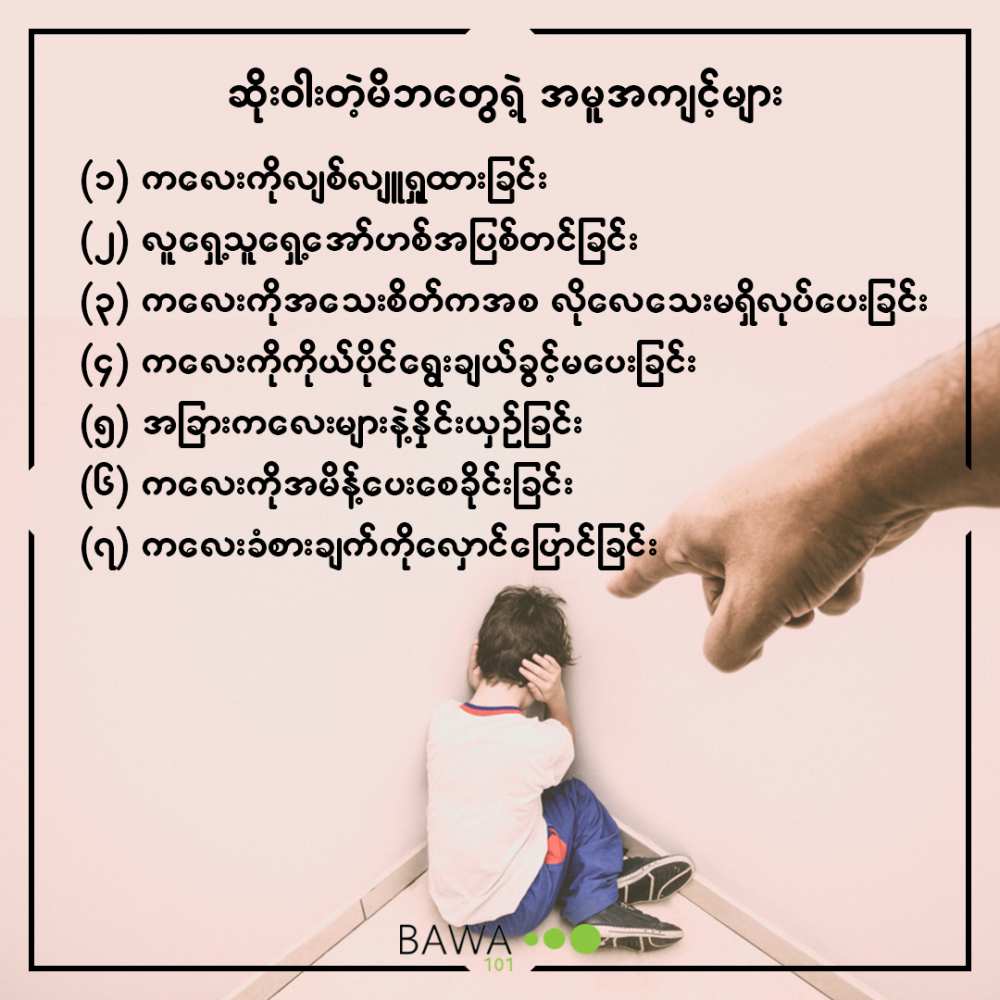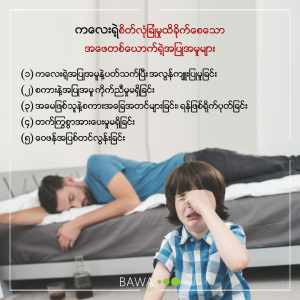Bad parenting behavior
"1) Child neglect Ignoring a child means that the child will have feelings throughout the child's li...
"1) Child neglect
Ignoring a child means that the child will have feelings throughout the child's life. I want a playmate, What are you thinking about? What are you feeling? What do you want to say? The child is doing what he wants to do. The child's mistakes, The kind of person who makes mistakes and says, "What are they doing?" Children who have been neglected in this way usually scream and run riot. Doing bad behavior, They tend to attract the attention of adults with methods such as sarcasm. That's why after neglecting the child, the child goes on a rampage. When the child gets attention, they say it's bad. In fact, parents should reflect on themselves.
2) Screaming in public
A child is just a child's intelligence. In order to become wise as an adult, parents must teach. That thought should be kept in mind by adults and parents should understand when children make mistakes. Bad parents don't think that way at all, and when they see their child's mistakes, they don't shy away from the public and condemn them. They tend to shout and beat each other. Then the child is embarrassed, More explorations with thick heat, It can scare you away from doing studies. In addition to that, small mindedness, Young people often get involved. Another type is such public shouting and blaming. When people get beaten up, they become little people, and they can become children who don't care what is said.
3) Making the child as detailed as possible
Another thing is to not tolerate the child's anger at all. Everything a child wants without a single cry. Everything you want to do is done by your parents. This also suppresses the child's innate ability because he is not able to live without help. If anything, it always makes me rely on others. If you want them to be smart and make their own decisions and make the right ones, let them make their own decisions.
4) Not allowing the child to make his own choice
This is also a way of restricting the child. As for the clothes, this is what I wear. (I don't care whether the child wants to wear it or not) As for the shoes, this is the one I bought with my son. (Just take this one) If it's a toy, this toy is expensive, just take it, etc. When you manipulate everything with love for the child, it causes the child to lose their personal freedom. Even if the child is perfect, without the happiness of one child, it is like a burden on another child.
5) Comparison with other children
This often makes the child jealous. Whose daughter is good, You are useless Who is at what level? Comparing with another child, like you and everyone else, affects the child's mood and makes the child feel small, In addition to feelings of inferiority, it is like cultivating jealousy to the point that it hurts the child who is being praised.
6) Asking the child to give orders
Commanding a child is the same as disrespecting the child's right to make decisions. In addition to that, without discussing the benefits of the child, "Just do what I ask, "Don't do as I do" is childish. When the child reaches adulthood, such things as stealing without the knowledge of the parents, Lies to parents, Doing what you want to do behind the scenes can happen. Parents need to be careful that the child's fear of doing what he commands can be a form of child rearing. When children grow up, they do not open up to their parents; not discussing Due to not being open, things that shouldn't happen can happen.
7) Mocking children's feelings
Disregarding a child's feelings is like destroying a child's willingness to trust and open up. If the child makes a mistake, think compassionately from the child's side and correct the truth. Understand the child's feelings. Please embrace and be kind. That's when the child believes in himself, Through talking, the parent will be able to understand the child's emotions and how to correct the child again. mocking the child, If the child reacts angrily when teasing is done, it is considered the child's fault, and the child often becomes rude. In addition to that, the child becomes small and may become passive because of the fear of being criticized for everything that happens.
The above points are not only for the parents, but also for those around the children. Those who care for the child and those who interact with the child should be aware of these points. It's less painful when almost everyone understands that a relationship with a child, not a parent, is important and like handling fragile glass with care. Only then will there be more children with less trauma."
Ignoring a child means that the child will have feelings throughout the child's life. I want a playmate, What are you thinking about? What are you feeling? What do you want to say? The child is doing what he wants to do. The child's mistakes, The kind of person who makes mistakes and says, "What are they doing?" Children who have been neglected in this way usually scream and run riot. Doing bad behavior, They tend to attract the attention of adults with methods such as sarcasm. That's why after neglecting the child, the child goes on a rampage. When the child gets attention, they say it's bad. In fact, parents should reflect on themselves.
2) Screaming in public
A child is just a child's intelligence. In order to become wise as an adult, parents must teach. That thought should be kept in mind by adults and parents should understand when children make mistakes. Bad parents don't think that way at all, and when they see their child's mistakes, they don't shy away from the public and condemn them. They tend to shout and beat each other. Then the child is embarrassed, More explorations with thick heat, It can scare you away from doing studies. In addition to that, small mindedness, Young people often get involved. Another type is such public shouting and blaming. When people get beaten up, they become little people, and they can become children who don't care what is said.
3) Making the child as detailed as possible
Another thing is to not tolerate the child's anger at all. Everything a child wants without a single cry. Everything you want to do is done by your parents. This also suppresses the child's innate ability because he is not able to live without help. If anything, it always makes me rely on others. If you want them to be smart and make their own decisions and make the right ones, let them make their own decisions.
4) Not allowing the child to make his own choice
This is also a way of restricting the child. As for the clothes, this is what I wear. (I don't care whether the child wants to wear it or not) As for the shoes, this is the one I bought with my son. (Just take this one) If it's a toy, this toy is expensive, just take it, etc. When you manipulate everything with love for the child, it causes the child to lose their personal freedom. Even if the child is perfect, without the happiness of one child, it is like a burden on another child.
5) Comparison with other children
This often makes the child jealous. Whose daughter is good, You are useless Who is at what level? Comparing with another child, like you and everyone else, affects the child's mood and makes the child feel small, In addition to feelings of inferiority, it is like cultivating jealousy to the point that it hurts the child who is being praised.
6) Asking the child to give orders
Commanding a child is the same as disrespecting the child's right to make decisions. In addition to that, without discussing the benefits of the child, "Just do what I ask, "Don't do as I do" is childish. When the child reaches adulthood, such things as stealing without the knowledge of the parents, Lies to parents, Doing what you want to do behind the scenes can happen. Parents need to be careful that the child's fear of doing what he commands can be a form of child rearing. When children grow up, they do not open up to their parents; not discussing Due to not being open, things that shouldn't happen can happen.
7) Mocking children's feelings
Disregarding a child's feelings is like destroying a child's willingness to trust and open up. If the child makes a mistake, think compassionately from the child's side and correct the truth. Understand the child's feelings. Please embrace and be kind. That's when the child believes in himself, Through talking, the parent will be able to understand the child's emotions and how to correct the child again. mocking the child, If the child reacts angrily when teasing is done, it is considered the child's fault, and the child often becomes rude. In addition to that, the child becomes small and may become passive because of the fear of being criticized for everything that happens.
The above points are not only for the parents, but also for those around the children. Those who care for the child and those who interact with the child should be aware of these points. It's less painful when almost everyone understands that a relationship with a child, not a parent, is important and like handling fragile glass with care. Only then will there be more children with less trauma."





